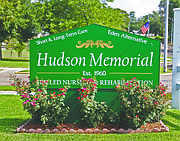Editor’s note: This is the third in a five-part series looking at nursing homes in Union County that are rated by Medicare. Each installment will cover a different nursing home facility and will publish on Sundays. All rating information can be found at Medicare.gov.
In less than 18 months, Hudson Memorial Nursing Home will celebrate its 60th anniversary, marking six decades since it opened as the first nursing home in El Dorado.
Named after former Union County Judge Frank Hudson, the facility was built after a group of local citizens recognized the need for a long-term assisted living facility for the elderly and chronically ill in the city.
Under the leadership of Hudson and Louis Hurley, a county board of directors and building committee were formed, with Hurley named as chairman of the board and committee.
The group explored government funding options that were available for such projects and selected a 10-acre site at the intersection of College Avenue and West Grove, next to what was then called El Dorado City Park (Old City Park).
As construction of the 22,500 square-foot facility neared completion, Hudson set about finding someone to manage and operate the nursing home.
Board members had heard about an Amish Mennonite group who operated a successful nursing home in Harrison and were impressed with how the Mennonite group incorporated its Christian ministry into running the facility.
In early 1959, the Conservative Mennonite Board of Missions and Charities, whose offices were in Ohio, sent a delegation on an exploratory visit to El Dorado.
The delegation determined that the Amish Mennonites could not take on the added responsibility at that time.
However, another delegation, which included L.L. Swartzentruber, arrived in El Dorado later that year for a more in-depth evaluation of the project and became actively involved in implementing plans and agreements with the county board.
The Mennonite board approved the general proposal the following month, and in September 1959, terms were negotiated for the Mennonites to manage Hudson.
Swartzentruber, who already had six years of experience running his own private nursing in Delaware when he was asked to join the Memmonite delegation, served as the liaison officer and Hudson’s first administrator.
Swartzentruber would go on to author a book, “The El Dorado Nursing Home Story,” detailing the unique history of the founding of Hudson Memorial Nursing Home.
The building was dedicated on Jan. 3, 1960, and the doors opened the following day, with five residents — Julius Meek. Four other residents Ella Nash, Mary Norris, Lillian Nelson and Pinkie Underwood — admitted the first day.
Since then, 2,220 residents have called HMNH home (as of Aug. 1).
Hudson is one of 56 nursing homes in the state that is individually owned.
Union County remains as the owner of the facility and its operations are overseen by a board of directors that includes Scott Fife, Richard Hanry, Caroline Hammond, Linda Partridge, Carla Gibson, Regina Lambert, Scott Harper and Union County Judge Mike Loftin.
As an Eden Alternative facility, Hudson incorporates a number of therapeutic programs that include animals, dogs and birds, and activities that help the nursing home environment feel less institutionalized and more like home.
Residents’ rooms are also personalized to their liking
Ratings and challenges
Carolyn Merritt and Helen Hampton, administrator and assistant administrator of Hudson, said that of the 86 residents that Hudson currently serves, none are Medicare patients.
Merritt explained that the star rating system that was developed by the Centers for Medicare and Medicaid Services is primarily driven by short-term stays.
“It’s like the ICU in the hospital. They need more care than the regular population needs, they meet those goals and needs and then they go back into the community,” Merritt said.
She said Hudson falls under the umbrella of the Arkansas Health Care Association and has long-term care patients.
According to the most recent ratings that are available on Medicare.gov, Hudson received two of five stars for its overall rating and of three ratings categories, Hudson received one star for health inspection; four stars for staffing; and a perfect five in quality measures.
An observation that was made Jan. 22 was that a dietary employee performed several tasks while preparing for during lunch service and handled several drinking glasses without washing her hands.
The same day and hour, another dietary employee handled several items with gloved hands and then touched the interior rims of several salad bowls with the same gloves.
Merritt said such citations are immediately addressed and resolved, and the staff deals with complaints on an individual basis, noting that complaints — those other than routine grievances from residents, such as a request change in the daily menu — vary from year to year from family or staff members, ranging from none to a few.
Pulling out a large binder, Merritt said complaints are recorded in a log.
Another citation came when a resident changed the oxygen level on his own health equipment, resulting in Hudson having to develop a new policy to rectify the matter.
She said the nursing home was recently fined when a resident left out at night to hunt for racoons, and the staff did not follow protocol when they noticed that he was missing from the building.
“They immediately began to look for him rather than notifying me and calling 911,” Merritt said.
The resident was found safe on the grounds a short time later, Merritt said, noting that he had nodded off while outside.
To meet new requirements for infection control — preventing the transmission of infections —, Hudson will have to hire a compliance officer by 2019 at a cost of $50,000.
“We’re not saying it’s not a good idea. It’s a great idea. It’s just having to find the money in the budget,” Merritt said.
The officer will monitor glove usage, focus on infection prevention, monitor and oversee related training and work with the Centers for Disease Control.
While Hudson has several long-term employees — one CNA has been there for 39 years —, the facility often has difficulty attracting staff to hire — an issue that nursing care facilities across the country are facing.
To augment low pay rates, Merritt said Hudson bolsters its benefit package with paid personal leave, low-cost group insurance and HealthWorks memberships.
PRN (used as needed) nurses also fill in when regular staff members are on vacation, Merritt said.
Tia Lyons may be contacted at 870-862-6611 or by email at tlyons@ eldoradonews.com.

